Lucy Atkins's Blog, page 4
March 2, 2020
How I write

I used to be afraid that I couldn’t ever write a novel because I could never think of a plot. What I didn’t realise was that authors don’t necessarily have to know the plot from the outset. I’m currently about 30,000 words into my fifth novel and while I’ve got the main characters and the locations, I still don’t really know what will happen. Instead of writing chronologically, I expand it all from the inside, going into scenes that I find interesting, and developing them – following the little shoots until they grow and blossom (or wither and die, at which point, I get out the shears). This process is both liberating and dreadful. It involves shutting down the critical voice, and trying to ignore the constant self-doubt. All being well, eventually I’ll have a first draft – an actual plot! – and then real work will begin: the editing, revising, rewriting, cutting and tightening that will make the CFD (crap first draft) into a novel.

February 6, 2020
Bad Mothers at Heffers, Cambridge

Motherhood in fiction is often portrayed as tender, blissful perfection but, as every mother knows, there are darker sides too – loss, despair, fear, exhaustion, confusion. Join leading suspense authors Sarah Vaughan and Lucy Atkins at Heffers as they discuss why they are drawn to the complicated reality of motherhood, and why this intensity and dysfunction is rich material for any writer.
23rd April 2020
Tickets for the event are priced at £6.00 in advance or £7.00 on the door, and can be purchased through this page, by calling 01223 463200 or in person at Heffers bookshop.
Buy Tickets here
Event begins at 6.30 pm and ends at 8.00 pm

Crime & Wine
Lucy and Sarah will be joined by Cara Hunter who will be chairing the discussion about Lucy and Sarah’s new novels Magpie Lane and Little Disasters. All three authors are masters of creating sophisticated and beautifully written suspense novels, so this is an event not to be missed!
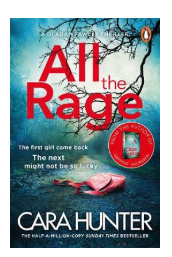
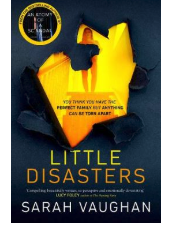
20th May 2020 7pm-8pm Buy Tickets here

‘The Art of Intrigue’ Oxford Literary Festival 2020
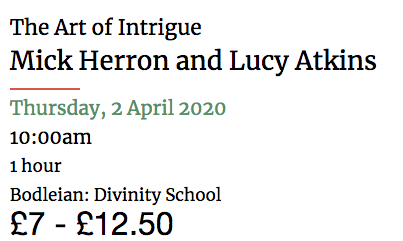 [image error]
[image error]What keeps readers reading? What makes some novels impossible to put down?
Spy novelist Mick Herron and suspense novelist Lucy Atkins discuss the ins and outs of hooking readers and creating complex, character-driven thrillers in this one hour discussion. Part of Oxford Literary Festival.
10am Thursday 2nd April 2020
Buy tickets here

Creative Writing Masterclass
24th April 2020
Buy tickets here


Award-winning authors, Lucy Atkins and Mick Herron, lead this comprehensive, invaluable creative writing masterclass.
11:00 – 13:00
1. To plan or not to plan? (& how to do both). Beginnings and endings. Plotting basics.
2. Settings: why they matter, how to choose one, the difference a setting makes.
13:00 – 14:00
Lunch
14:00 – 16:00
3. Creating believable characters: how to develop both main characters and extras. Using detail, interactions, backstory & dialogue to build characterisation.
4. Page turning techniques: how to keep the reader reading. How to create intrigue, and raise the stakes.

November 19, 2019
MAGPIE LANE – coming 2nd April 2020

Full of hidden chambers, and some of them are haunted . . .part thriller, part love story, wholly beguiling. I was glued to every page
Mick Herron
When the eight year old daughter of an Oxford College Master vanishes in the middle of the night, police turn to the Scottish nanny, Dee, for answers. As Dee looks back on her time in the Master’s Lodging – an eerie and ancient house – a picture of a high achieving but dysfunctional family emerges: Nick, the fiercely intelligent and powerful father; his beautiful Danish wife Mariah, pregnant with their child; and the lost little girl, Felicity, almost mute, seeing ghosts, grieving her dead mother. . .
Roaming Oxford’s secret passages and hidden graveyards, Magpie Lane explores the true meaning of family, and what it is to be denied one.

August 13, 2019
Food & Conversation at Northcote
June 4, 2019
Mick Herron: An Evening of Espionage
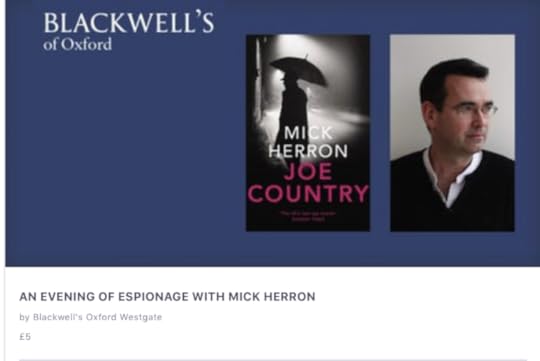
I’m pleased to say that on 27th June I get to ask Mick Herron, author of the bestselling Slough House spy series, about his writing habits, whether he and Jackson Lamb share many characteristics, and, perhaps most importantly, how much farting is too much. Mick & I have had many cups of coffee in Blackwell’s whilst trying not to meet our deadlines. He is obviously way worse at this than me since Joe Country is his 6th Slough House novel. Book a place here

Waterstones Oxford Crime & Wine Event
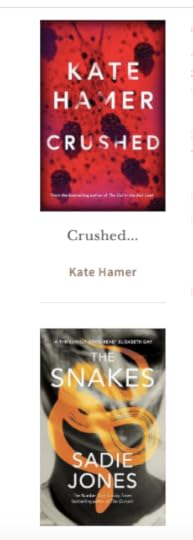
On 13th June 2019 I’ll be talking to two excellent novelists in Oxford: Sadie Jones (The Snakes) and Kate Hamer (Crushed), about writing suspenseful fiction, and tackling dark, complex themes. Book tickets here

October 30, 2018
Pitching To An Agent – 20 Tips for Success
From the ‘How to Get Your Book Published’ masterclass, by Lucy Atkins and Fanny Blake.
I’ve put together these tips because agents are busy and small (or big) mistakes can put them off reading your work. There is no ‘type’ of person who gets published, other than a person who can write well. Do not feel intimidated. Literary agents – the people who will sell your book to a publisher – are just people, generally really nice people, who love books.
Pitching to a Literary Agent – 20 Tips for Success
1. Good writing grabs an agent’s attention and nothing else – don’t make your own book jacket or marketing material or perform any attention grabbing tricks or gimmicks eg. shiny wrapping, free gift enclosed.
2. Follow the instructions the agent gives on their website for submitting your work. ONLY do this. Nothing else.
3. Target ONE agent per agency (and not at random – select them carefully according to their list, their stated interests, whether they are taking clients). Try five at a time, from the The Writers & Artists Yearbook, which has a comprehensive list of agents. Keep a spreadsheet or up to date list so you don’t infuriate anyone with multiple submissions.
4. Proof-read EVERYTHING – grammatical and spelling mistakes can get you on the ‘no’ pile even if you write well.
5. Most agents want something like the first three chapters plus a synopsis. Make sure those first three chapters of your book are your absolute best work and that they plunge your reader right into your story. Double space, justify, sensible font, 12 pt.
6. Write a snappy but sensible introductory email. Avoid adverbs, gushing, exclamation marks, emojis, showing off or modesty, false or otherwise. Simply state who you are, any relevant credentials, what your book is, and that you hope they will enjoy it.
7. A synopsis is a summary of your book. It needs to be short and to the point – just a glimpse of your plot and characters – NOT a blurb (ie. lots of excitable language ‘selling’ the story). Usually 1-2 pages of double spaced 12 point type, max.
8. No silly fonts, coloured paper, visual aids, emojis or ANYTHING in your submission (unless it’s part of your experimental novel).
9. Target an agent according to who their authors are (authors who are writing similar books to you – their agent will be name-checked in their acknowledgements).
10. Show you are familiar with the agent’s existing list of authors (& spell their authors’ names correctly!).
11. Look on Twitter/other social media/agent websites for agents who are actively requesting submissions. These may be young agents building a list. They tend to say what kind of books they want.
12. Your covering email shouldn’t be any longer than a paragraph or two. Make sure it highlights why your book is distinctive and interesting.
13. Don’t pitch yourself as ‘the new…’ or ‘x meets x’ because that will probably irritate them.
14. Mention any writing credentials but only if they are solid and relevant. eg. if you’ve won a serious short story prize (the high school English prize isn’t going to swing it).
15. Mention any contact who has referred you – but don’t worry if you have no contacts. Agents don’t care! Plenty of writers with no contacts at all in the literary world get publishing deals.
16. Mention if you’ve previously submitted to them or being in touch with one of their other agents (ie with a previous book).
17. If your work is rejected don’t write back telling them why they’ve made the mistake of their lives.
18. If they want to see more, don’t gush or do ‘OMGs’, just send them the book in the format they ask for, with a dignified ‘thank you for your interest’.
19. Accept that you will almost certainly get LOTS of rejections and that this does not mean you will never be published/have no talent/are wasting your time.
20. Keep trying. Don’t give up!
For more tips, see my other ‘How to Get Published’ blog posts here (some will repeat some of the info above though).





